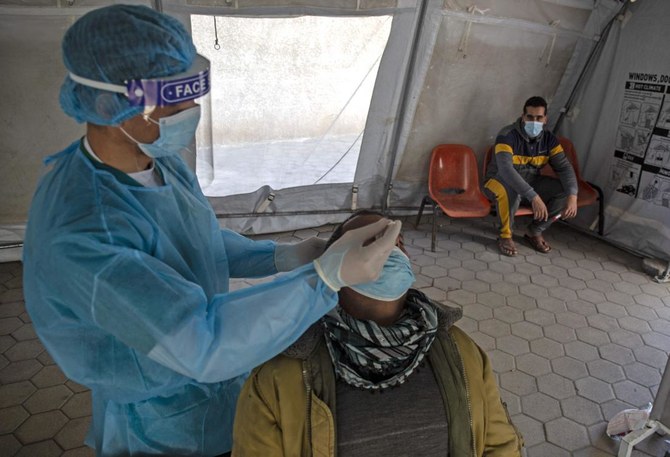GAZA CITY: Israel allowed the Palestinian Authority to deliver the first coronavirus vaccines to the Gaza Strip on Wednesday despite objections from Israeli lawmakers who suggested they be used as a bargaining chip for the release of captives held by the territory’s Hamas rulers.
Israel has faced international criticism for largely excluding Palestinians in the occupied West Bank and Gaza from its highly successful vaccination campaign. It held up the shipment for two days as the government faced questioning from a parliamentary committee before ultimately approving it.
The dispute highlights the Palestinians’ reliance on Israel even as they struggle to combat the pandemic on their own. It’s also a potent example of global inequality in the rollout of vaccines, most of which have been scooped up by wealthy countries.
The shipment finally arrived midday Wednesday at the Kerem Shalom crossing. Palestinian Health Minister Mai Alkaila said the PA sent 2,000 doses of the Russian-made Sputnik V vaccine — enough to inoculate only 1,000 people in an impoverished territory that is home to 2 million Palestinians.
Gaza has been under a crippling Israeli-Egyptian blockade since Hamas seized power from PA forces in 2007. Gaza’s Health Ministry has reported more than 53,000 cases and at least 538 deaths since the start of the pandemic, and authorities have been reluctant to impose widespread lockdowns because the territory is already mired in poverty.
Israel and Hamas have fought three wars and numerous skirmishes since they took control of Gaza.
In an interview Wednesday with Israel’s army radio station, Prime Minister Benjamin Netanyahu said he was working on bringing captive Israelis back from Gaza, but did not link the issue to vaccines. He noted the vaccines were from Palestinian supplies, and said it was important that Palestinians be vaccinated because the virus can easily cross into Israel.
“This is not from Israeli supplies,” he said. “I am committed to bringing back the prisoners and the missing in action at any price. We are working on this these days, but the epidemiological issue is not connected.”
During Monday’s parliamentary debate, Zvi Hauser, chair of the foreign affairs and defense committee, argued that the vaccine delivery should be linked to progress on the release of two Israeli captives held by Hamas and the remains of two Israeli soldiers killed in a 2014 war. He also expressed concern that vaccines would go to Hamas members rather than medics.
Ahmad Tibi, an Arab member of parliament, called the discussion “shameful,” saying: “In 20 years, your children will also be ashamed of this position of vaccination prevention.”
The Palestinian Authority said the first doses would go to front-line medical workers. But Ashraf Al-Qedra, spokesman for the Gaza Health Ministry, said they would be administered in two phases, first to vulnerable patients and then to health care workers.
“The amount is very small and not enough to cover all 12,000 medical workers,” he said. “We think it’s better to first inoculate vulnerable patients, such as organ transplant and dialysis patients.”
The ministry said vaccinations would begin Sunday due to inclement winter weather that could make it dangerous for patients to travel to hospitals.
Israel has launched one of the world’s most successful vaccination programs, inoculating more than a third of its population of 9.3 million since December after securing millions of doses from pharmaceutical giants Pfizer and Moderna.
Rights groups say it has an obligation as an occupying power to share its vaccines with the Palestinians. Israel captured east Jerusalem, the West Bank and Gaza in the 1967 war, territories the Palestinians want for their future state.
Israel denies having such an obligation and says its priority is its own citizens. It is vaccinating Palestinian residents of annexed east Jerusalem, which it considers part of its capital. Israel withdrew troops from Gaza in 2005, and it says the Palestinian Authority is responsible for health care in the territories it administers according to interim peace agreements.
The Palestinian Authority, which governs parts of the occupied West Bank, has not publicly requested vaccines from Israel and says it has secured its own supply through the World Health Organization and agreements with drug makers.
Still, Israel provided 2,000 doses of the Moderna vaccine to the PA earlier this month, allowing it to begin vaccinating medical workers, and the PA says it independently acquired 10,000 doses of the Sputnik V vaccine.
Hamas is believed to be holding two captives, an Israeli of Ethiopian descent who entered Gaza shortly after the 2014 war, and an Arab Bedouin citizen of Israel. In exchange, Hamas is likely to demand the release of a large number of Palestinian prisoners held by Israel, including individuals implicated in deadly attacks.


After delay, Israel allows vaccines into Hamas-run Gaza
Short Url
https://arab.news/peu4t
After delay, Israel allows vaccines into Hamas-run Gaza

- Gaza, which has a population of two million, has reported more than 53,000 cases of the coronavirus and 538 deaths
UAE says Algeria move to end air pact has no immediate impact on flights

- On Saturday, Algeria said it has begun the process of cancelling its air services agreement with the UAE, signed in Abu Dhabi in 2013
ABU DHABI: The United Arab Emirates said that Algeria's notification to terminate an air services agreement between the two countries will not have any "immediate impact on flight operations", the state news agency WAM reported on Sunday, citing the country's General Civil Aviation Authority (GCAA).
On Saturday, Algeria said it has begun the process of cancelling its air services agreement with the UAE, signed in Abu Dhabi in 2013.
GCAA said the air services agreement with Algeria remained in force "during the legally mandated notice period," without giving further details.
© 2026 SAUDI RESEARCH & PUBLISHING COMPANY, All Rights Reserved And subject to Terms of Use Agreement.














